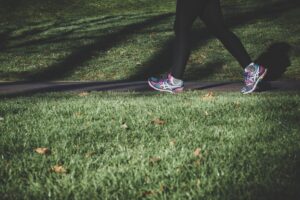
There are lymphedema exercises for legs that can relieve mild swelling! Now, when you have swollen legs, that could mean you have venous insufficiency. (Called VI for short, this develops when your veins can't properly circulate blood, particularly impacting the lower extremities). As a result, you may develop symptoms such as edema, or minor swelling in the lower legs. Then, if edema persists for too long, you'll face an increased risk for venous ulcers, which are non-healing wounds that form (usually on your legs) due to increased pressure on your veins.
To avoid such outcomes, it's important to control edema. To that end, we often prescribe compression stockings to our patients; they provide targeted pressure to help pooled blood flow out of the legs and up to the heart. When that happens, leg swelling improves. And that results can also be achieved by elevating your legs, so your feet are higher than your heart, helping blood flow out of them. Already, you've got two great ways to combat swelling. But guess what? We're offering even more tips to control VI and edema, and they involve your diet and exercise routine!
If you've noticed mild leg edema, try changing your diet before seeking more invasive solutions! Start by reducing salt intake. Excess sodium can make you retain water, worsening edema symptoms. But don't just put down the salt shaker: also be wary of products like canned soups. packaged cheeses and even pickles with sky-high sodium content.
Next on our to-do list? Increase your fluid intake. By drinking more water, you make it easier for the body to flush out retained fluids. In other words, loading up on H20 is a great way to manage edema.
Not a big water drinker? You can try other liquids, such as lemon water, since it offers more flavor with the added bonus of a toxin-flushing boost! Another great choice is cranberry juice, since it's rich in can also potassium, magnesium, and calcium as well.
Of course, while your diet can help relieve mild swelling, it can't combat vein disease alone. So, if your edema is linked to vein disease, make sure to schedule a consult with our Georgia endovascular specialists.
When you're living with the chronic swelling of edema or lymphedema, wear loose-fitting clothing and steer clear of tight shoes or jewelry. The only time we want you to wear something tight is if we prescribe compression socks for regular use.
On that note, patients with lymphedema should also avoid using heating pads or standing for extended periods of time. When you can take a seat, try to elevate your legs. And don't even think about tattooing areas of your body that are affected by swelling.
If you've been medically cleared for physical activity, these lymphedema exercises for legs could become an important part of your daily routine:
Of course, the best way to protect your vein health is to see our experts and address any underlying concerns. So, you start to notice even minor leg swelling, click here to request an appointment. That way, we can stay on top of your vein health and prevent more serious complications
Sources: thehealthsite.com, healthline.com

Atlanta
3225 Cumberland Blvd. Southeast, Suite 520
Atlanta, GA 30339
Stockbridge
1035 Southcrest Dr., Suite 220 + 250
Stockbridge, GA 30281
Tucker
1975 Lakeside Pkwy., Suite 300
Tucker, GA 30084
Scheduling
Please contact our dedicated specialists to schedule a consultation today.
2025 Georgia Endovascular. All rights reserved. Website Design by Healthcare Success